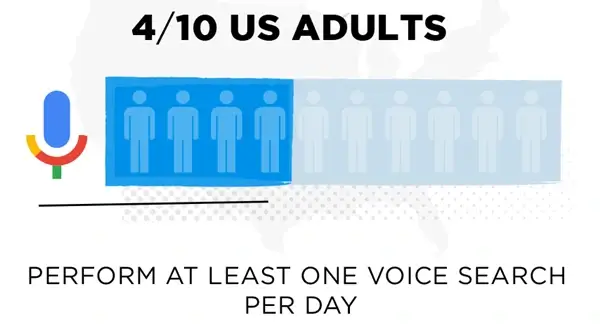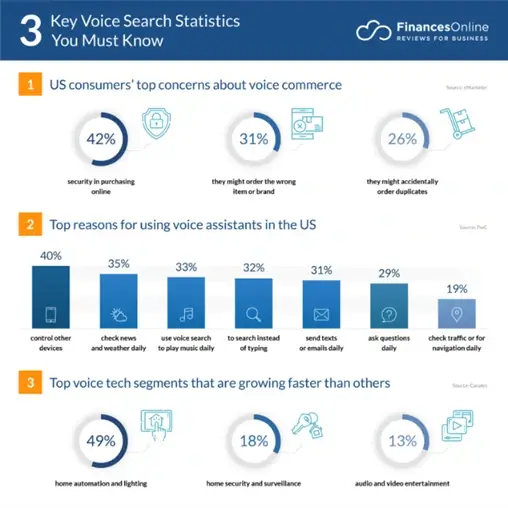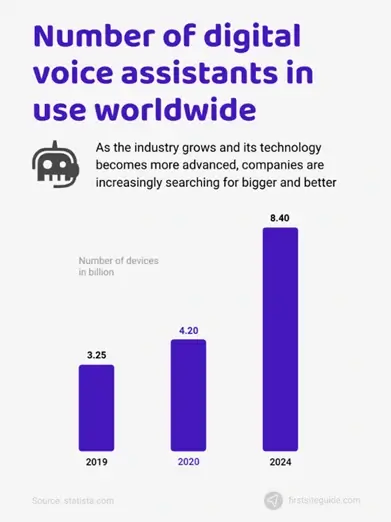
Talking to a device, a watch, or a virtual assistant is becoming an everyday activity as chatting on the phone. While many of us are used to taking part in a live webchat with a real person, speaking to a computer rather than typing on a screen has been an adjustment. But it's not nearly as unfamiliar an experience as it once was, and it has many advantages.
Voice search is a convenient, hands-free way to access information, news, entertainment, and of course, websites.
Not having to type and swipe allows users to continue with another task. It's the tech equivalent of talking to a friend while preparing a meal or jogging. Voice search technology has also become more sophisticated and reliable, easier to use, and accessible to those who find using text a challenge.
Voice search is now a vital component of any website's SEO strategy, and it's no longer simply a case of making sure you effectively optimize your website for voice search. With the technology growing in sophistication and scope, it's important to remember that the aim now is not simply voice recognition but more nuanced speech understanding.
Why Voice Search Optimization Matters
Investing in voice search optimization for your website is a direct investment in your business and profits. Reaching customers is one function of a website; allowing customers to reach your business and make requests is the other. Both are important. If you've neglected voice search until now, it's worth remembering how fast consumer habits and expectations change.
For example, you would be hard-pressed these days to find a business that doesn't have a web presence, however rudimentary. In fact, when you come across a company with no website or social media presence, it's quite a shock, and today's consumers are left wondering how to interact with such a business outside of store hours.
You could argue that a website that isn't optimized for voice search will soon seem as limited as a business with no website. There is every motivation to keep up with customers and their habits and give them what they expect and need to access what your business offers.
Let's look at how to optimize your website for voice search effectively, but first, let's talk about what it is and how it works.
What is Voice Search, and How Does it Work?
Voice search enables a person to say, rather than type, search criteria. The function requires activation words, known as 'wake' phrases. A wake phrase usually says something like, 'OK' followed by the search engine name. With the function activated, the user can then say the search words, and the search engine can begin analyzing. It's also possible to start a voice search by tapping a microphone icon.
There is, of course, a difference between how users activate voice searches as opposed to typing, but after initiating the search, it functions in precisely the same way as a typed search. Users are taken to a list of sites, and those with greater optimization will be nearer the top.

For this reason, voice search optimization is as crucial as standard SEO. Just as you would aim to optimize your lead generation form with voice search, you aim to have your pages read out by the device.
But there are differences with voice search. For one thing, it obviously feels very different speaking rather than typing. You are using a very human-to-human form of communication, and users tend to say fuller sentences and use more natural language and complex phrases than they would if they were tapping into a search bar. This means extra considerations for those working in search marketing.

If voice search is new to you, it's a helpful exercise to put yourself in the shoes of a potential customer and search for similar products or services to those of your business. It can be a real eye-opener to see how the function searches out and lists your competitors. In fact, it's wise to add this research to your checklist before launching a website.
Think Dialogue for Content
Voice is not a new element in the online space; there are already chatbots and voice recognition for call centers, and even voice-related fraud such as voice phishing. In fact, it's advisable to find ways to secure your chatbots because of this. But optimizing your website for voice search presents different challenges.
It's important to remember that voice search picks up on more conversational keywords. This means a website needs content that is dialogue friendly. But what does this actually mean in practice? Well, let's go back to the fact that voice search involves a person asking a device a question.
Fundamentally, it's the search engine's job to find the answer to that question. So, making sure much of your website content reads like solutions can be very advantageous for getting your business on the search engine results page.
One simple fix is to add frequently asked questions sections to your site and focus your blogs and other content, such as titles and subheadings, as if they are also answering questions. Do your homework on common queries in your field of business, and use these as prompts to create a copy that addresses them. These are simple and effective actions that can really boost your website's usefulness when it comes to voice search.

Use Long-Tail Keywords
The nature of voice searching means that users are far more likely to say longer keywords. For example, a person might say: 'what is a cloud engineer?' rather than 'cloud engineer.'
This happens for various reasons; partly, saying something aloud is quicker than typing, so a user may feel inclined to elaborate, but it also feels somewhat unnatural to say rather than type shorter search words.
For this reason, when you research the kinds of phrases to use in your content, it's vital to include long-tail keywords to optimize your website for voice search. Search engines also read back results to users and having your site's content appear high enough for target users to hear relies heavily on how well you have constructed your content to respond to long-tail keywords. Pay enough care and attention to this, and your average e-commerce conversion rates should reflect your efforts.

As we've seen, voice search users are far more likely to ask specific, more detailed questions. It's important to optimize for these queries to feature in snippet boxes the numbered lists that appear when, for example, you search for shoe stores in a particular city.
These snippet boxes appear just under the search bar and get populated with relevant phrases from websites. Fortunately, just as there are tools to test your website, there are now keyword tools to check for long-tail keywords to target. You can then incorporate these into your website copy to maximize your chances of getting in snippet boxes and the main SERP.

Focus on Mobile
Telecommunication for business is ever-evolving and developing. Businesses have to keep up with the latest advances covering everything from cloud-based call centers to asking themselves what virtual PBX is?
But undoubtedly, the biggest area of telecommunications for business is mobile. Voice search via a mobile device is a common way to go online for the under 25s. But the number of older users is also growing rapidly.
Users are by now familiar and comfortable using their voice to search their phones for contacts, make calls, get directions, open apps, and access music, so migrating to voice-assisted search is a fairly natural step. Voice search is also increasingly sensitive to natural speech, and technology that has NLP (natural language processing) is making talking to your device even easier. Thankfully, the days of shouting a tricky word at your phone multiple times until it gets the message are in the past.
To give your business the best chance of taking advantage of mobile voice search, the user experience is absolutely vital. SEO ranking is important, but a fundamental part of this is how the user experiences your content. For this interaction to be easy and successful, your website should be designed to be responsive, automatically changing, and adapting to the content to suit the device it's being viewed on.
Your website needs to be visually optimized for mobile, with content fitting the screen and easy to view. But the content also needs to be optimized for voice search. Both things are critical to a good user experience. It's worth taking the time to check that your web content is mobile-friendly.

Optimize for Local
Depending on your business, local customers can be the lifeblood of a company. There is an immediacy factor to this, and a person can search for a business in their neighborhood and go there that day, ready to make a purchase or use a service. The spontaneous nature of local commerce means that customers are more likely than other consumers to be using voice search on the move before immediately acting on what they have found.
'Near me' is what really counts for local users. They aren't necessarily looking for the best business globally, but they are looking for the best of the nearest.
Claiming your company's listing on Google is the most important step for appearing in local voice searches. But make sure your company information is really clear and, above all, complete. You'll need to include photos, a short description of your business, trading hours, a phone number, and a website link.
Having driven traffic to your website, make sure it's local friendly. The way to optimize for local voice search users is to make sure your location is included both in your content and your metadata and that pages are location specific. It's worth paying attention to images that can be tagged to your region or city. Transcripts of any video content that mentions your location are also a good idea. All of these steps will help your business appear in local listings.
Summary
Having a website optimized for voice search, as we have seen, is a growing necessity and something that all companies with an online presence need to get ahead of. It can mean reshaping the content on your site, creating new copy, and doing your homework when it comes to long-tail keywords and frequently asked questions. It also means focusing on the mobile experience for users and making sure your website is optimized for local customers.
Optimizing your website for voice search means essentially thinking about language, taking the time to consider and research what your target customer might be looking for, how they might phrase a question or request, and what they would ideally expect to hear in response.
This is just the first step, and the key thing is going back to your web content and making sure it contains the answers and information in the proper format and provides the responses your customers are seeking. Voice search is a kind of conversation, and to join in, you need to give your business the language it needs to speak up and get your message out there.
Having a website optimized for voice search, as we have seen, is a growing necessity and something that all companies with an online presence need to get ahead of. It can mean reshaping the content on your site, creating new copy, and doing your homework when it comes to long-tail keywords and frequently asked questions. It also means focusing on the mobile experience for users and making sure your website is optimized for local customers.
Optimizing your website for voice search means essentially thinking about language, taking the time to consider and research what your target customer might be looking for, how they might phrase a question or request, and what they would ideally expect to hear in response.
This is just the first step, and the key thing is going back to your web content and making sure it contains the answers and information in the proper format and provides the responses your customers are seeking. Voice search is a kind of conversation, and to join in, you need to give your business the language it needs to speak up and get your message out there.


 Copyright 2000-2026, WebSitePulse. All rights reserved.
Copyright 2000-2026, WebSitePulse. All rights reserved.